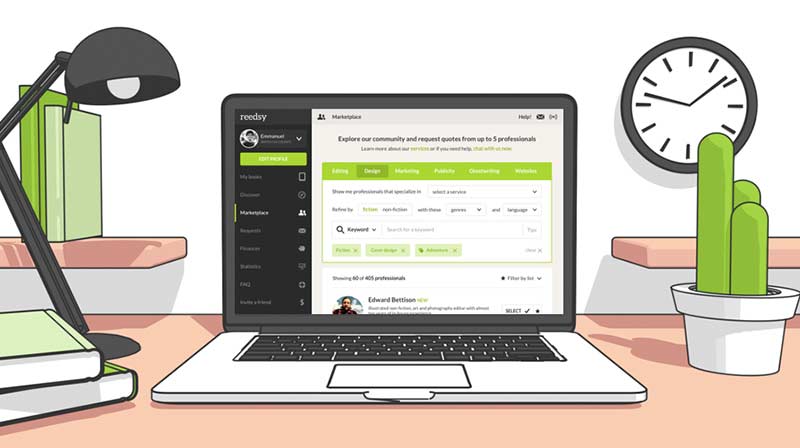As an author, it's crucial to have an online hub for your work, news, and contact information. A specialist web designer can create a unique author website that perfectly suits your needs.
Here's what you get with a professional web designer from Reedsy:
Learn more
Website hosting and domain setup
In order to present your website to the world, you need to purchase web hosting and a domain name. As the name suggests, a web host stores your content. A domain name is the URL that points to your server (often www.YourName.com). A web developer will advise you on which domain name registrar and web hosting service provider will best suit your needs.
What can I expect from this service?
Many different companies sell hosting services and domain names, and they often sell both at once. Reedsy recommends that you keep control of your website's hosting and don't rely on a third party to keep your website available. This means that you’ll be able to update your subscription and renew your domain by yourself. A web developer will help you choose your services and manage them yourself in the future.
CMS Setup
Once you’ve configured your web hosting and domain, your web developer will install a CMS (content management system), such as WordPress. A CMS will make your life easier, allowing you to quickly edit the content on your site without touching any code.
What can I expect from this service?
Your web designer will work with you to find a suitable CMS. They’ll also provide a tutorial so that you can comfortably modify and add content when you have updates.
Branding and design
Creating a functional website can be straightforward enough, but matching the design to your personality while transporting your reader to the worlds within your books is a much larger challenge. A professional web developer can help you define your brand as an author.
What can I expect from this service?
When visitors land on your site, they should immediately know whether you're a writer of horror, sci-fi, or historical romance (and so on). Beyond communicating your genre, your author website should also feel like it fits your writing style and author persona. this is incredibly unique to each writer — but it’s a web designer’s job to help you develop a visual identity that feels ‘right’ while appealing to your target audience.
SEO
Search engine optimization (SEO) configures your website to improve its rank in search engines' unpaid results (mainly on Google). A website developer can help ensure that your site actually shows up when people search for your name, your book title, and other terms related to your work.
Do I need SEO?
Yes — if you want your website to be discoverable via search engines. If you have a common name, it might be tricky to rise to the top of search results, but SEO can help. And besides people already searching for you, SEO can help you grow your audience. For example, if you write non-fiction, your book might be a great resource for people with specific problems and questions. Strong SEO can ensure your book shows up when potential readers Google relevant questions.
What can improve SEO?
Search engine optimization for your website means improving site speed, using the right HTML tags, and creating the right structure for your content (which is especially important if you have blog entries). A web developer can ensure all features of your site are SEO-optimized.
Newsletter signup and lead magnets
Your website is a hub for all your book marketing activity — and you can implement features that build your fan base. For instance, including a newsletter signup allows you to keep in touch with your readers and reengage them when you publish new work.
How do you get them to sign up in the first place? Lead magnets incentivize readers to provide their contact information in exchange for free content. Just about anything can be a lead magnet, but authors often find it especially effective to give away a free piece of writing.
How can a web developer help?
A developer can help connect your mailing list with your website and figure out the best place for the email entry form (e.g., at the bottom of your home page, on its own page, or serving as a pop-up).
If you’d like to use a lead magnet to entice potential subscribers, they can help you design and advertise the content you’ve chosen. They’ll also make sure your mailing list is properly configured to deliver the magnet as promised.
Blog
As a writer, there's a good chance that there are a zillion things you'd like to share with the world. A blog is a perfect spot to offer insights about your writing while growing your online presence. A professional web designer can help you set up a blog in your CMS. Then, you'll be able to create and update posts by yourself in no time at all.
Do I need to blog?
There are more ways than ever to connect with your audience, from social media to mailing lists to blogs. One advantage of blogging, though, is the opportunity to improve your SEO. If you’d like your writing to be discoverable via search engines, blogging may be a better fit than an author newsletter. Your web developer can provide advice on an effective SEO strategy.
Resources related to web design
- How To Build an Author Website: a Step-by-Step Guide [+ Checklist]: A step-by-step guide to creating a functional, attractive website.
- 13 Author Websites That Get It Right: Get inspiration for your site from these all-star examples.
- Video: Digital Marketing for Authors: Websites 101: A ReedsyLive talk (with transcript) hosted by book marketer and author Michael Doane.
